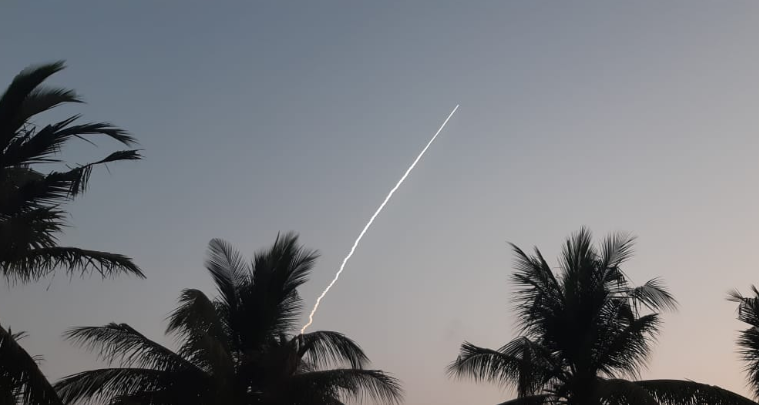
Highlights
CHENNAI: Eight years after launching the last satellite in the Risat series, the Indian Space Research Organisation (Isro) began the expansion of its radar imaging satellite fleet in space with the successful launch of Risat-2B onboard a Polar Satellite Launch Vehicle (PSLV) on Wednesday morning. Risat uses synthetic aperture radar to provide all-weather surveillance.
PSLV-C46 carrying Risat 2B -- which weighs 615kg -- lifted off from the first launch pad at Satish Dhawan Space Centre in Sriharikota at 5.30am, as scheduled. It was the 48th flight of PSLV and the 14th flight in 'core-alone' configuration where solid strap-on motors were not used. It was the third launch by Isro in 2019.
Around 15 minutes after the lift-off, the four-stage rocket successfully placed the satellite in a 557km circular orbit. With a mission life of five years, the radar imaging earth observation satellite developed by Isro, with its X-band radar, will provide services in the fields of agriculture, forestry and disaster management support.
It will have military applications, as well. Unlike the usual remote sensing and optical imaging satellites, a radar imaging satellite can penetrate through thick cloud cover and identify hidden objects on the ground.
 PSLV-C46/Risat-2B mission seen from Chennai (TOI photo)
PSLV-C46/Risat-2B mission seen from Chennai (TOI photo)
The first satellite in the Risat series -- Risat 2 --was launched on April 20, 2009. The 300kg satellite used an X-band synthetic aperture radar sensor made by Israel Aerospace Industries. Risat-1 launch was postponed to prioritise the launch of Risat-2 after the 2008 Mumbai terror attack.
Risat-1, an indigenously developed radar imaging satellite, was launched on April 26, 2012. All these satellites had a five-year mission life.
PSLV-C46 carrying Risat 2B -- which weighs 615kg -- lifted off from the first launch pad at Satish Dhawan Space Centre in Sriharikota at 5.30am, as scheduled. It was the 48th flight of PSLV and the 14th flight in 'core-alone' configuration where solid strap-on motors were not used. It was the third launch by Isro in 2019.
Around 15 minutes after the lift-off, the four-stage rocket successfully placed the satellite in a 557km circular orbit. With a mission life of five years, the radar imaging earth observation satellite developed by Isro, with its X-band radar, will provide services in the fields of agriculture, forestry and disaster management support.
It will have military applications, as well. Unlike the usual remote sensing and optical imaging satellites, a radar imaging satellite can penetrate through thick cloud cover and identify hidden objects on the ground.

The first satellite in the Risat series -- Risat 2 --was launched on April 20, 2009. The 300kg satellite used an X-band synthetic aperture radar sensor made by Israel Aerospace Industries. Risat-1 launch was postponed to prioritise the launch of Risat-2 after the 2008 Mumbai terror attack.
Risat-1, an indigenously developed radar imaging satellite, was launched on April 26, 2012. All these satellites had a five-year mission life.
Download The Times of India News App for Latest India News.
Make sense of the 2019 Lok Sabha elections and results on May 23 with TOI. Follow us to track latest news, live updates, news analysis and cutting-edge data analytics. Track live election results, the big trends and fastest updates on counting day with India's largest news network.
#ElectionsWithTimes
more from times of india news
Elections 2019

Trending Topics
LATEST VIDEOS
More from TOI
Navbharat Times
Featured Today in Travel
Quick Links
Rajasthan election 2019Andhra Lok Sabha electionGujarat Election 2019Karnataka Election 2019MP Lok Sabha electionMaharashtra election 2019West Bengal Lok SabhaTamil Nadu election 2019UP Election 2019Bihar election 2019UP Election DateAndhra Election DateBihar Election DateAndhra Assembly ElectionLok SabhaMP Election DateMaharashtra Election DateShiv SenaYSRCPTDPWB Election DateJDUCongressBJP newsGujarat Election DateSC ST ActUIDAIIndian ArmyISRO newsSupreme CourtRajasthan Election DateTelangana Election DateTamilrockers 2018Uttarakhand newsSikkim newsOrrisa newsKarnataka Election DateNagaland newsSatta KingManipur newsMeghalaya news
Get the app










